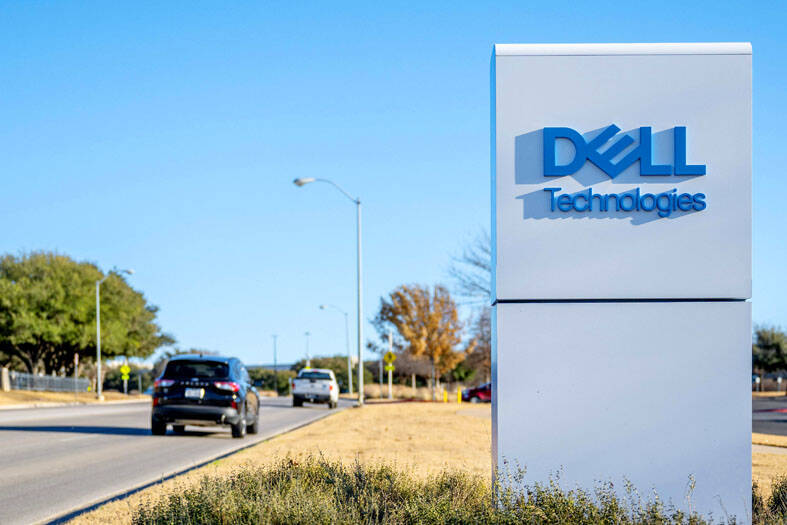Dell Technologies Inc is planning to stop using Chinese-made chips by next year and has told suppliers to reduce the amount of other made-in-China components in its products amid concerns over US-China tensions, the Nikkei reported yesterday.
The computer maker late last year told suppliers that it aims to meaningfully lower the amount of Chinese-made chips it uses, including those produced at facilities owned by non-Chinese chipmakers, the report added, citing three people with direct knowledge of the matter.
Dell has also asked suppliers of other components, such as electronic modules and print circuit boards, and product assemblers to help prepare capacity in countries beyond China, such as Vietnam, the report said.

Photo: AP
The report came after the US last month added Chinese memorychip maker Yangtze Memory Technology Corp (長江存儲) and 21 “major” Chinese players in the artificial intelligence chip sector to a trade blacklist.
In October last year, US President Joe Biden’s administration published a set of export controls that included a measure to cut China off from certain semiconductor chips made anywhere in the world with US tools.
PC maker HP Inc, one of Dell’s rivals, has also begun surveying its suppliers to gauge the feasibility of moving production and assembly away from China, the Nikkei reported.
Dell and HP did not immediately respond to a Reuters request for comment.
Separately, China’s Luxshare Precision Industry Co (立訊精密) yesterday said its cooperation with current clients was normal, in response to a media report that iPhone maker Apple Inc had asked suppliers to cut production.
The electronics manufacturer said it wanted to clarify a recent report from a Taiwanese media company that said Luxshare had suffered the biggest impact from the Apple request.
“There are no special changes or impact to the relevant business of the company mentioned in the report,” Luxshare said in a statement.
“Currently the company’s cooperation with existing customers is progressing normally and the business is moving forward in an orderly manner according to the work plan,” the company said.
Luxshare makes connector cables for iPhones and Macbooks, manufactures AirPods, and owns factories capable of making iPhones.
Apple had told suppliers to manufacture fewer components for its ear buds, watches and laptops as a sluggish global economy and high inflation might hurt demand for Apple devices, a report by the Nikkei said on Monday, citing unnamed suppliers.

SEMICONDUCTORS: The German laser and plasma generator company will expand its local services as its specialized offerings support Taiwan’s semiconductor industries Trumpf SE + Co KG, a global leader in supplying laser technology and plasma generators used in chip production, is expanding its investments in Taiwan in an effort to deeply integrate into the global semiconductor supply chain in the pursuit of growth. The company, headquartered in Ditzingen, Germany, has invested significantly in a newly inaugurated regional technical center for plasma generators in Taoyuan, its latest expansion in Taiwan after being engaged in various industries for more than 25 years. The center, the first of its kind Trumpf built outside Germany, aims to serve customers from Taiwan, Japan, Southeast Asia and South Korea,

POWERING UP: PSUs for AI servers made up about 50% of Delta’s total server PSU revenue during the first three quarters of last year, the company said Power supply and electronic components maker Delta Electronics Inc (台達電) reported record-high revenue of NT$161.61 billion (US$5.11 billion) for last quarter and said it remains positive about this quarter. Last quarter’s figure was up 7.6 percent from the previous quarter and 41.51 percent higher than a year earlier, and largely in line with Yuanta Securities Investment Consulting Co’s (元大投顧) forecast of NT$160 billion. Delta’s annual revenue last year rose 31.76 percent year-on-year to NT$554.89 billion, also a record high for the company. Its strong performance reflected continued demand for high-performance power solutions and advanced liquid-cooling products used in artificial intelligence (AI) data centers,

Gasoline and diesel prices at domestic fuel stations are to fall NT$0.2 per liter this week, down for a second consecutive week, CPC Corp, Taiwan (台灣中油) and Formosa Petrochemical Corp (台塑石化) announced yesterday. Effective today, gasoline prices at CPC and Formosa stations are to drop to NT$26.4, NT$27.9 and NT$29.9 per liter for 92, 95 and 98-octane unleaded gasoline respectively, the companies said in separate statements. The price of premium diesel is to fall to NT$24.8 per liter at CPC stations and NT$24.6 at Formosa pumps, they said. The price adjustments came even as international crude oil prices rose last week, as traders

SIZE MATTERS: TSMC started phasing out 8-inch wafer production last year, while Samsung is more aggressively retiring 8-inch capacity, TrendForce said Chipmakers are expected to raise prices of 8-inch wafers by up to 20 percent this year on concern over supply constraints as major contract chipmakers Taiwan Semiconductor Manufacturing Co (TSMC, 台積電) and Samsung Electronics Co gradually retire less advanced wafer capacity, TrendForce Corp (集邦科技) said yesterday. It is the first significant across-the-board price hike since a global semiconductor correction in 2023, the Taipei-based market researcher said in a report. Global 8-inch wafer capacity slid 0.3 percent year-on-year last year, although 8-inch wafer prices still hovered at relatively stable levels throughout the year, TrendForce said. The downward trend is expected to continue this year,